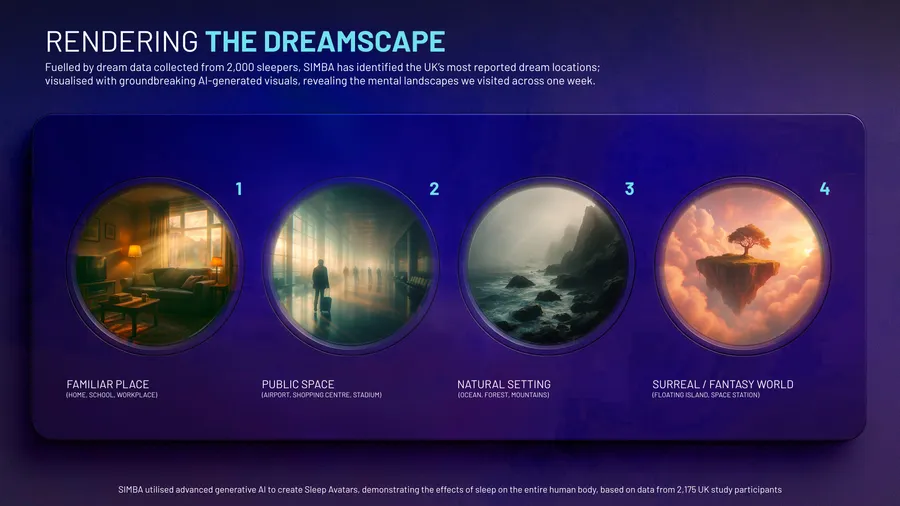The findings, conducted in partnership with Simba’s charity partner, The Sleep Charity, paint a compelling portrait of the UK’s collective subconscious.
At the heart of the research is a question: Are we running towards something, or away from it? The findings underscore a striking contrast between stress and escapism in Britain's subconscious.
A quarter (25%) of UK adults found themselves trapped in anxiety-driven dreams, whether being chased, lost, or running late, while over a fifth (23%) of those surveyed escaped into more uplifting dreamscapes, filled with romance, adventure, and the sensations of success.
Women were notably more likely to experience stress-heavy dreams (30% vs. 20% of men), while men were more prone to surreal or fantastical dream worlds (19% vs. 12% of women).
Nostalgia remained a dominant theme, with reuniting with someone from the past emerging as the nation's most common dream (13%).
Some of us dreamt of soaring weightless above the clouds, whilst over a quarter [26%] of people recalled finding themselves in new romantic encounters or reliving cherished memories from the past.
To bring these dreams (and fears) to life, Simba has leveraged advanced generative AI, marking a world first in sleep research. By analysing the descriptions of thousands of real dreams, AI-generated imagery visually reconstructs the science of the subconscious, offering a never-before-seen glimpse into the nation’s sleeping mind.
Lisa Artis, Deputy CEO of Simba’s charity partner The Sleep Charity, explains: "Dreams are the brain’s way of processing emotions, memories, and stress. The fact that so many people are dreaming about being late, being chased, or feeling trapped suggests that high levels of daily anxiety and stress are carrying over into sleep."
The UK’s most common nightmares reflect deep-seated anxieties and primal fears, with over 1 in 10 [11%] of Brits experiencing nightmares about being chased, lost, or trapped, followed by a further 16% of adults experiencing fears of falling, being unable to move or even the classic horror of teeth falling out.
The external world also plays a role in shaping our dreamscapes. Personal relationships proved to be the strongest influence, with over a third [34%] of people finding their dreams rooted in real-world connections.
Financial stress was another major factor, affecting nearly 1 in 4 [23%] of sleepers, while work pressures weighed heavily on the subconscious of a further 22% of those surveyed.
Meanwhile, TV, films, and books before bed influenced 19% of dreams, with news and politics shaping the thoughts of 18%, showing how daily experiences and global events infiltrate even our most intimate dream states.
The study also uncovered a phenomenon Simba has termed ‘Dream Surge.’ Saturday night saw the highest volume of recalled dreams, with more people remembering their dreams on Sunday morning than on any other day of the week.
Experts suggest this could be due to longer weekend lie-ins, which allow for deeper, extended sleep cycles, increasing dream intensity and recall. Additionally, the well-documented ‘Sunday Scaries’ - anxiety about the week ahead - may contribute to a rise in emotionally charged dreams.
Steve Reid, CEO of Simba, comments: "Dreams are a reflection of our deepest subconscious. Now, by bringing this research to life with cutting-edge AI, we can start to make connections to our lives out of bed. Ultimately, being more aware about what fuels our dreams helps us understand ourselves and how we can better protect our sleep quality."
Reid continues: "Restorative sleep starts with the right conditions, and that includes high-quality essentials like mattresses, toppers, pillows and duvets. At Simba, we use innovative design and materials across our range to support deeper, more consistent sleep, helping people rest better, recover overnight, and wake feeling more refreshed. This includes our patented titanium alloy Aerocoil® springs, 'cool-touch' Stratos® technology, and other features developed to actively enhance sleep quality."
Despite these vivid dreamscapes, not everyone remembers what happens in their sleep. While 13% of Brits recall a dream almost every night, a third rarely remember them at all, suggesting that for many, the subconscious remains just out of reach.




